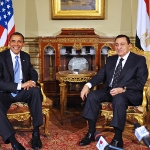More than a year after the election of U.S. President Barack Obama, supporters of political reform and human rights in the Arab world are still trying to discern his administration’s approach toward democracy in the region. In many respects, President Obama’s budget request for Fiscal Year 2011, recently submitted to the U.S. Congress, does suggest a commitment to democracy and governance. But shifts in his administration’s approach to one of the most important countries in the region—Egypt—has sent worrying signals to advocates of reform.
This comes at a critical moment in Egypt. President Mubarak’s recent surgery and hospitalization in Germany has awoken many Egyptians to the very real possibility of an imminent leadership change. These health concerns, along with the recent return to Egypt and potential candidacy of Mohamed ElBaradei, have sparked serious domestic debates over the future of the government. Meanwhile, the Egyptian government continues to take regressive steps away from political reform. On April 6, Egyptian police arrested dozens of activists protesting in Cairo on the two-year anniversary of a nationwide strike. A bill recently drafted by the Egyptian Ministry of Social Solidarity threatens to wipe out independent civil society organizations. And in May the government is widely expected to renew its repressive emergency law.
Against this backdrop, several shifts in the Obama administration’s approach to foreign assistance during its first year have sparked concern among supporters of democratization. Total bilateral funding for democracy and governance programming was reduced from approximately $50 million annually to only $20 million. Within this amount, the level of funding for civil society was cut disproportionately, from $32 million to only $7 million, and the U.S. Agency for International Development (USAID) adopted a policy of only funding those organizations officially registered and approved as NGOs by the Egyptian government. Moreover, the administration began negotiations on the possible establishment of an “endowment,” a fund advocated by the Egyptian government to remove Congressional oversight over future U.S. economic aid.
Many in the democracy community were heartened by the October 2009 release of an internal audit of USAID’s democracy and governance programming. The report attributes the limited impact of USAID’s programs to a lack of Egyptian government cooperation: “the Government of Egypt has resisted USAID/Egypt’s democracy and governance program and has suspended the activities of many U.S. NGOs because Egyptian officials thought these organizations were too aggressive.” The audit describes numerous examples of Egyptian government interference: a program for media development was unsuccessful because “the State Information Service was uncooperative;” a decentralization program was not implemented because “the Government of Egypt was hesitant to act;” and when a project was making progress, the local governor was replaced with a less supportive governor, causing the project to collapse.
The USAID audit states clearly that the “Office of Democracy and Governance achieved its greatest success in its civil society direct grants program.” This program, established in 2005, is the only portion of USAID’s programming in Egypt in which funds are given directly to independent Egyptian organizations, rather than implemented with Egyptian government ministries. And although direct grants projects are less dependent on Egyptian government cooperation and are therefore more successful, the government of Egypt nonetheless also managed to interfere with many of those projects: implementing NGOs experienced long delays, waiting for Egyptian government approval of projects or partner organizations; the Egyptian government suddenly cancelled planned training events on anticorruption and political reform and arbitrarily suspended the delivery of civic education materials.
A clear lesson from the USAID audit is that the less the Egyptian government is involved with democracy and governance programming, the greater the opportunity for such programming to succeed. Many supporters of democracy hoped that, in response to this audit, USAID would reverse the sharp cuts in funding for civil society and its decision to fund only registered NGOs. The new budget request for 2011, however, ignores key conclusions of the audit and continues in the direction of increased funding for programs done in conjunction with the Egyptian government and decreased funding given directly to civil society. To be fair, other U.S. government institutions (such as the Department of State’s Middle East Partnership Initiative and Bureau of Democracy, Human Rights, and Labor) provide support for civil society and political competition but their resources are extremely limited as compared with those expended by USAID.
Democracy promotion is not only about assistance programs. It could be that the Obama administration is merely electing to support democratization in Egypt through behind-closed-doors diplomacy. But if that is the case, there are no positive results to show so far. Until that changes, the signals the Obama administration is sending will continue to alarm supporters of Egyptian democracy who are hoping for U.S. support.
Stephen McInerney is Director of Advocacy at the Project on Middle East Democracy.


.jpg)



